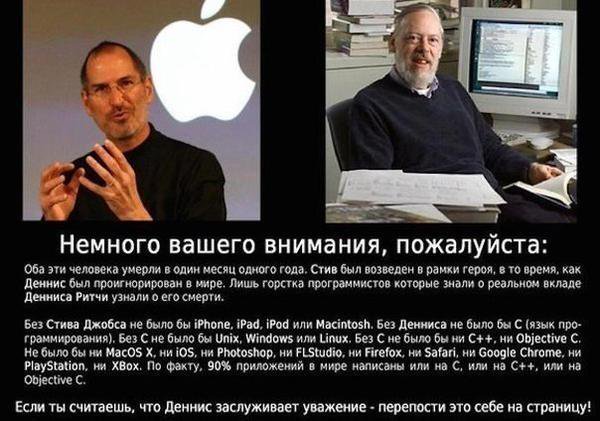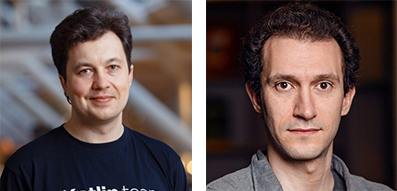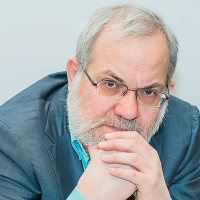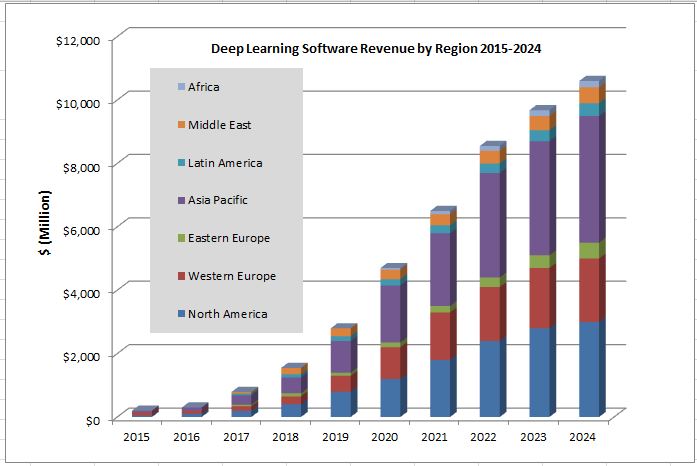Unnoticed IT
Noticed the unevenness of human attention to different achievements? The memes that Steve Jobs and Dennis Ritchie left almost at the same time, but society only noticed the death of the first, although the contribution of the second to IT is gigantic:

The reality is inexorable: no matter how talented the screenwriter of the film, the actors always get more attention because they are visible. No matter how professional the creator of server technology, Mark Zuckerberg will attract more attention, because the average user interacts with his project directly. This is normal: we all do not notice something that we do not directly encounter.
In this post there will be a small swim in the specifics of the organization of events, as well as Kotlin, Machine Learning and the creator of the OS Phantom. Briefly about the post in one picture ( yes, you will soon understand what this is about ):

If you organize an event, from a simple meeting of developers in your own office to an IT festival for two thousand people, the hidden part of what is happening is just as important as what is in sight. For the participant, this is a huge additional content that increases the value of what is happening many times. For the organizer - this is a set of guiding ideas. It remains to do so as not to miss this hidden part.
The proposed scheme: to draw people's attention to the "unnoticed" things and explain their significance. For example, now we are launching the TechTrain festival , and we see several stories that will be discussed.
It so happened that people love wonders, especially technological wonders. To attract the attention of the audience you need something really bright and unusual. For the internal meeting in the company, some successful project will work. What to do if rates are rising and you need to collect a large platform? Let's grab some hidden story by the tail and put ourselves in the service.
Here is a bright contrast. On the one hand, even people far from IT know the concept of “programming language” and understand that this is the most important component of the development. But on the other hand, in the mass consciousness there is a complete lack of reflection on the theme of the fact that someone else also develops these languages. For society, they are felt by such “laws of nature”: we did not choose physical formulas, but simply discovered them, and so programming languages were given to us on tablets by higher powers. And even when Swift was loudly introduced in 2014, Chris Luttner’s name didn’t figure in everyday discussions of this news, but there was only a blurry “Apple” (which for many means “higher powers”).

It turns out that if you delve into the question, you understand: almost the most interesting thing in programming languages is that such a fundamental thing is made by living people. They put their subjective ideas about right and wrong into the language. Often they themselves do not understand how to correct. These are people who experience emotions and may make mistakes. And which, of course, deserve respect: the creation of a popular language is a big job, a big responsibility and a big benefit.
In this area, a story is happening now, which many developers are well aware of, but almost everyone else knows: the rise of the Kotlin language. If you now have an Android phone in your pocket, then you know firsthand about the results of the work of Android developers. Now, the development for Android is actively moving to Kotlin, accompanied by stormy enthusiasm (“how now it has become more convenient than before with Java”). For the user, this means some magical improvement in the work of their favorite phones and gadgets.

This language was created by the Russian company JetBrains, and perhaps this is the main success of Russian IT in the international arena since the advent of the Nginx web server. Generally speaking, the country could be proud: in St. Petersburg, a modern technological product has appeared that is used with delight all over the world, including in the largest companies. From the side, this success is not obvious (when you use a mobile application, you don’t see in what language it is written), and as a result, the triumph remains unnoticed.
The fact that others do not notice him does not prevent us from noticing it, even if we are not connected with Android development. And use for the benefit of the case. We shamelessly used the understanding of the situation to call Roman Elizarov from JetBrains. He will tell you why in 2018 new programming languages are needed, when there are already a lot of old ones. And the head of the whole project, Andrei Breslav, we convinced to participate in a series of blitz-questions. Of course, it will be surrounded by specific technical issues by developers already writing to Kotlin, but there are a few more general questions.

The question is to systematically monitor such opportunities and lay the foundation for them. How does systematicity help in this case? Look, someone will ask: but, after all, Andrey and Roman are unusually busy people, how could you convince them? It looks like a trick with getting a rabbit out of a hat. The focus is simple: both Andrei and Roman are far from being the first time at our conferences (the others are those who are directly about hardcore programming). When it was necessary to do something large-scale for TechTrain , the soil was prepared for it. A system is what makes an impossible mission into an understandable task.
With such a base, you can do anything. You can build IT-festivals, you can do local meetings. Someone wonders how to make a popular corporate blog on Habré that readers will not heyt? Yes, and it can be done. "We pay attention and explain the significance." There will be a couple more stories there, and now I will not repeat this part of the proof - for them it is the same.
The second story is not about how something significant is not noticed, but about how it is quickly forgotten.
Thinking through the idea of TechTrain, we realized that we definitely need to invite opinion leaders, leading technology bloggers, and so on. Different people of different directions, who - according to the idea - will give a voluminous picture of modern IT. Maybe some founding fathers of the Russian Internet?
But you see, the founding fathers do not go down the street. These are the people who rarely shine in the top of YouTube, preferring instead to do important things. (Actually, this is a typical problem of searching for speakers for any event claiming depth). We need to somehow get them and bring to clean water. An excellent goal for our methodology is to “search for the hidden and explain the significance”!
And we will look, yes-yes, in our own experience and memories.
Today, a young man who is interested in technology and follows techloblogers may not speak about Dmitry Zavalishin at all . At the same time, in the late nineties and the beginning of the 2000s, his site dz online , where Dmitry himself and other authors wrote, was the most important resource for Runet. In fact, he was a techno-blogger before such a word arose.

( screenshot of the operating system Phantom , the author of the concept of which is Dmitry )
Here you can say "well, and why in 2018 remember the author of the site from the XX century, technology is so rapidly developing that it is now meaningless to remember that content and be equal to those authors". And I do not agree with that.
The addresses dz.ru and dz.yandex.ru no longer open, but if you go to the site via the WayBack Machine, you can stick on for a long time on the topics raised there many years ago. How to correctly synchronize data between a computer and a PDA? ( link ) How will the Internet affect remote work? ( link ) What is the new “USB drive” device and is it better than the usual floppy disks? ( link ).
If you figure out "what the technology was then and what people thought about them," it allows you to take a fresh look at everything that surrounds us today. Well, simply, it's scary curious. At that time, much of what was written on the site was ahead of its time: thoughts “how to make work with a mobile device more convenient” seemed like a handful of geeks with a PDA, until suddenly the whole world began to carry it in a pocket on a mobile device.
 That is, we have a person who decades ago watched technology closely and understood them well. After that, I did not get away from the IT-industry, but I stopped leading the site and went headlong into managerial tasks.
That is, we have a person who decades ago watched technology closely and understood them well. After that, I did not get away from the IT-industry, but I stopped leading the site and went headlong into managerial tasks.
Further agree that he spoke at TechTrainwith the report "Practices and Cases of Project Management" was a matter of technology. The experience helps him to see the situation in perspective: he saw project management even when the broad masses of the people did not hear about all these your AJIles. I would have approached him with a couple of questions about the future of technology.
By the way, Zhenya Trifonov ( phillennium) just told a story: sometime at the beginning of the 2000s, when he was a high-tech enthusiast and sometimes read dz online, he wrote a letter to Dmitry with several questions. Dmitry responded - and, if the memory does not fail Zhenya, he complained in response that “now sites show the same banners to everyone in a row, like television advertising, although on the Internet it would be possible for different users to show different ones”. In fact, in that old letter, he anticipated the takeoff of personalized advertising. It is very interesting what opportunities for development he sees now.
There are many dimensions in which the search for new ideas is taking place, and the rewinding of the history of the Russian Internet is only one of the techniques for studying these dimensions. We must not forget this and exploit to the fullest.
Not only experts are aware of how important machine learning is. You can often see news that thanks to ML cars they learned to drive cars, beat people in go, write songs in the spirit of “Civil Defense” and recognize tumors. In everyday life, we are confronted with voice assistants and with the recognition of objects in the photo. At Google presentations, the abbreviation “AI” sounds, it seems, more often than the word “Google” itself.

( Source: 5th World Machine Learning and Deep Learning Congress )
Much is said about new applications of machine learning, but the people who make it all happen are left behind the scenes. The information field looks as if machines are already learning everything on their own. And this is still an overly optimistic assessment of the situation (or pessimistic, depending on your views on the threats of AI).
This is largely due to the fact that machine learning does not have any single leader, which Linus Torvalds became for the Linux world, and Richard Stallman became for the free software world. (By the way, we called them too, but Richard’s schedule is too tight). Many people all over the planet are working on the opportunities now opening up, and we owe our brave new world to all of them at once, and not to someone alone. And all together in a head you will not keep.
Anyway, it is useful to learn at least a few of them. To dispel the feeling that progress is happening by itself. To get some insight into the people on whom the future depends.
For this you can, for example, watch on YouTube several speeches from ML-specialists. You can google and some introductory materials for beginners, and more specific for those who already have some level of training.
Obviously, for the success of the festival is the perfect theme. We quickly called Roman Udovichenko — the head of the traffic handling team in the direction of the unmanned vehicles of Yandex. He will tell how such cars predict the behavior of other motorists and pedestrians. We also called Ivan Yamshchikov - he created the same project “Neural Defense” with songs “under Egor Letov”; in his speech, he will be told how our world is changing thanks to the accumulated data and what cannot change after all.
And there will be Andrei Zakonov from VKontakte, Dmitry Soshnikov from Microsoft, Vitaly Khudobakhshov from JetBrains, and even Dmitry "Goblin" Puchkov himself will conduct an interview with Ivan Yamshchikov. Not bad, huh? In short, anyone can find something interesting about ML there, regardless of the degree of prior acquaintance with the topic.
All these became possible not from scratch, but through systematic work on the principles described above. Anyone can do this, it is very simple in theory. However, in practice, it requires special skill and manual dexterity, but this is already a topic for a separate story and a separate habrapost.
Finally, I want to ask everyone the following question: what kind of people in IT do you think deserve far more attention than they get? Who would you like to see? Surely we are missing something valuable, and Habr is the best place to fill in the gaps.

The reality is inexorable: no matter how talented the screenwriter of the film, the actors always get more attention because they are visible. No matter how professional the creator of server technology, Mark Zuckerberg will attract more attention, because the average user interacts with his project directly. This is normal: we all do not notice something that we do not directly encounter.
In this post there will be a small swim in the specifics of the organization of events, as well as Kotlin, Machine Learning and the creator of the OS Phantom. Briefly about the post in one picture ( yes, you will soon understand what this is about ):

If you organize an event, from a simple meeting of developers in your own office to an IT festival for two thousand people, the hidden part of what is happening is just as important as what is in sight. For the participant, this is a huge additional content that increases the value of what is happening many times. For the organizer - this is a set of guiding ideas. It remains to do so as not to miss this hidden part.
The proposed scheme: to draw people's attention to the "unnoticed" things and explain their significance. For example, now we are launching the TechTrain festival , and we see several stories that will be discussed.
History 1. Programming languages
It so happened that people love wonders, especially technological wonders. To attract the attention of the audience you need something really bright and unusual. For the internal meeting in the company, some successful project will work. What to do if rates are rising and you need to collect a large platform? Let's grab some hidden story by the tail and put ourselves in the service.
Here is a bright contrast. On the one hand, even people far from IT know the concept of “programming language” and understand that this is the most important component of the development. But on the other hand, in the mass consciousness there is a complete lack of reflection on the theme of the fact that someone else also develops these languages. For society, they are felt by such “laws of nature”: we did not choose physical formulas, but simply discovered them, and so programming languages were given to us on tablets by higher powers. And even when Swift was loudly introduced in 2014, Chris Luttner’s name didn’t figure in everyday discussions of this news, but there was only a blurry “Apple” (which for many means “higher powers”).

It turns out that if you delve into the question, you understand: almost the most interesting thing in programming languages is that such a fundamental thing is made by living people. They put their subjective ideas about right and wrong into the language. Often they themselves do not understand how to correct. These are people who experience emotions and may make mistakes. And which, of course, deserve respect: the creation of a popular language is a big job, a big responsibility and a big benefit.
In this area, a story is happening now, which many developers are well aware of, but almost everyone else knows: the rise of the Kotlin language. If you now have an Android phone in your pocket, then you know firsthand about the results of the work of Android developers. Now, the development for Android is actively moving to Kotlin, accompanied by stormy enthusiasm (“how now it has become more convenient than before with Java”). For the user, this means some magical improvement in the work of their favorite phones and gadgets.

This language was created by the Russian company JetBrains, and perhaps this is the main success of Russian IT in the international arena since the advent of the Nginx web server. Generally speaking, the country could be proud: in St. Petersburg, a modern technological product has appeared that is used with delight all over the world, including in the largest companies. From the side, this success is not obvious (when you use a mobile application, you don’t see in what language it is written), and as a result, the triumph remains unnoticed.
The fact that others do not notice him does not prevent us from noticing it, even if we are not connected with Android development. And use for the benefit of the case. We shamelessly used the understanding of the situation to call Roman Elizarov from JetBrains. He will tell you why in 2018 new programming languages are needed, when there are already a lot of old ones. And the head of the whole project, Andrei Breslav, we convinced to participate in a series of blitz-questions. Of course, it will be surrounded by specific technical issues by developers already writing to Kotlin, but there are a few more general questions.

The question is to systematically monitor such opportunities and lay the foundation for them. How does systematicity help in this case? Look, someone will ask: but, after all, Andrey and Roman are unusually busy people, how could you convince them? It looks like a trick with getting a rabbit out of a hat. The focus is simple: both Andrei and Roman are far from being the first time at our conferences (the others are those who are directly about hardcore programming). When it was necessary to do something large-scale for TechTrain , the soil was prepared for it. A system is what makes an impossible mission into an understandable task.
With such a base, you can do anything. You can build IT-festivals, you can do local meetings. Someone wonders how to make a popular corporate blog on Habré that readers will not heyt? Yes, and it can be done. "We pay attention and explain the significance." There will be a couple more stories there, and now I will not repeat this part of the proof - for them it is the same.
History 2. Tehnoblogging and the 90s
The second story is not about how something significant is not noticed, but about how it is quickly forgotten.
Thinking through the idea of TechTrain, we realized that we definitely need to invite opinion leaders, leading technology bloggers, and so on. Different people of different directions, who - according to the idea - will give a voluminous picture of modern IT. Maybe some founding fathers of the Russian Internet?
But you see, the founding fathers do not go down the street. These are the people who rarely shine in the top of YouTube, preferring instead to do important things. (Actually, this is a typical problem of searching for speakers for any event claiming depth). We need to somehow get them and bring to clean water. An excellent goal for our methodology is to “search for the hidden and explain the significance”!
And we will look, yes-yes, in our own experience and memories.
Today, a young man who is interested in technology and follows techloblogers may not speak about Dmitry Zavalishin at all . At the same time, in the late nineties and the beginning of the 2000s, his site dz online , where Dmitry himself and other authors wrote, was the most important resource for Runet. In fact, he was a techno-blogger before such a word arose.

( screenshot of the operating system Phantom , the author of the concept of which is Dmitry )
Here you can say "well, and why in 2018 remember the author of the site from the XX century, technology is so rapidly developing that it is now meaningless to remember that content and be equal to those authors". And I do not agree with that.
The addresses dz.ru and dz.yandex.ru no longer open, but if you go to the site via the WayBack Machine, you can stick on for a long time on the topics raised there many years ago. How to correctly synchronize data between a computer and a PDA? ( link ) How will the Internet affect remote work? ( link ) What is the new “USB drive” device and is it better than the usual floppy disks? ( link ).
If you figure out "what the technology was then and what people thought about them," it allows you to take a fresh look at everything that surrounds us today. Well, simply, it's scary curious. At that time, much of what was written on the site was ahead of its time: thoughts “how to make work with a mobile device more convenient” seemed like a handful of geeks with a PDA, until suddenly the whole world began to carry it in a pocket on a mobile device.
 That is, we have a person who decades ago watched technology closely and understood them well. After that, I did not get away from the IT-industry, but I stopped leading the site and went headlong into managerial tasks.
That is, we have a person who decades ago watched technology closely and understood them well. After that, I did not get away from the IT-industry, but I stopped leading the site and went headlong into managerial tasks. Further agree that he spoke at TechTrainwith the report "Practices and Cases of Project Management" was a matter of technology. The experience helps him to see the situation in perspective: he saw project management even when the broad masses of the people did not hear about all these your AJIles. I would have approached him with a couple of questions about the future of technology.
By the way, Zhenya Trifonov ( phillennium) just told a story: sometime at the beginning of the 2000s, when he was a high-tech enthusiast and sometimes read dz online, he wrote a letter to Dmitry with several questions. Dmitry responded - and, if the memory does not fail Zhenya, he complained in response that “now sites show the same banners to everyone in a row, like television advertising, although on the Internet it would be possible for different users to show different ones”. In fact, in that old letter, he anticipated the takeoff of personalized advertising. It is very interesting what opportunities for development he sees now.
There are many dimensions in which the search for new ideas is taking place, and the rewinding of the history of the Russian Internet is only one of the techniques for studying these dimensions. We must not forget this and exploit to the fullest.
History 3. Machine learning
Not only experts are aware of how important machine learning is. You can often see news that thanks to ML cars they learned to drive cars, beat people in go, write songs in the spirit of “Civil Defense” and recognize tumors. In everyday life, we are confronted with voice assistants and with the recognition of objects in the photo. At Google presentations, the abbreviation “AI” sounds, it seems, more often than the word “Google” itself.

( Source: 5th World Machine Learning and Deep Learning Congress )
Much is said about new applications of machine learning, but the people who make it all happen are left behind the scenes. The information field looks as if machines are already learning everything on their own. And this is still an overly optimistic assessment of the situation (or pessimistic, depending on your views on the threats of AI).
This is largely due to the fact that machine learning does not have any single leader, which Linus Torvalds became for the Linux world, and Richard Stallman became for the free software world. (By the way, we called them too, but Richard’s schedule is too tight). Many people all over the planet are working on the opportunities now opening up, and we owe our brave new world to all of them at once, and not to someone alone. And all together in a head you will not keep.
Anyway, it is useful to learn at least a few of them. To dispel the feeling that progress is happening by itself. To get some insight into the people on whom the future depends.
For this you can, for example, watch on YouTube several speeches from ML-specialists. You can google and some introductory materials for beginners, and more specific for those who already have some level of training.
Obviously, for the success of the festival is the perfect theme. We quickly called Roman Udovichenko — the head of the traffic handling team in the direction of the unmanned vehicles of Yandex. He will tell how such cars predict the behavior of other motorists and pedestrians. We also called Ivan Yamshchikov - he created the same project “Neural Defense” with songs “under Egor Letov”; in his speech, he will be told how our world is changing thanks to the accumulated data and what cannot change after all.
And there will be Andrei Zakonov from VKontakte, Dmitry Soshnikov from Microsoft, Vitaly Khudobakhshov from JetBrains, and even Dmitry "Goblin" Puchkov himself will conduct an interview with Ivan Yamshchikov. Not bad, huh? In short, anyone can find something interesting about ML there, regardless of the degree of prior acquaintance with the topic.
All these became possible not from scratch, but through systematic work on the principles described above. Anyone can do this, it is very simple in theory. However, in practice, it requires special skill and manual dexterity, but this is already a topic for a separate story and a separate habrapost.
Finally, I want to ask everyone the following question: what kind of people in IT do you think deserve far more attention than they get? Who would you like to see? Surely we are missing something valuable, and Habr is the best place to fill in the gaps.
